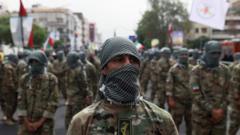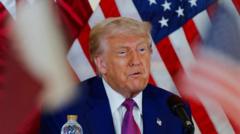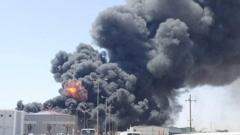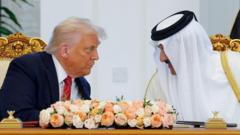President Trump's desire for a nuclear agreement with Iran faces scrutiny from hardline Republicans while Gulf nations express support for negotiations, fearing the consequences of a nuclear-armed Iran.
Trump Seeks Iran Deal Amid Diverging Regional Perspectives

Trump Seeks Iran Deal Amid Diverging Regional Perspectives
As President Trump pushes for a nuclear deal with Iran, Gulf leaders endorse diplomatic solutions to avoid further conflict in the Middle East.
In a diplomatic overture, President Trump has signaled his willingness to negotiate a deal with Iran regarding its nuclear program, emphasizing a desire to prevent military conflict. Speaking during his recent trip in Saudi Arabia, Trump stated, “I want to make a deal with Iran. If it creates a safer region and world, I’ll be very happy.” This marks a notable shift from previous approaches advocating regional isolation of Iran, as Gulf leaders now seek de-escalation rather than confrontation.
Historically viewed as a significant threat, Iran's nuclear ambitions have alarmed many in the region. However, as tensions persist, these same Gulf Arab states are increasingly pushing for dialogue, recognizing the dire consequences of perpetual instability. Analysts like Ali Vaez from the International Crisis Group underline the potential ramifications of either a nuclear-armed Iran or a military strike aimed at curbing its capabilities, urging for peaceful negotiations.
However, Trump’s proposition may create friction among the Republican Party's entrenched hardliners, who have long demanded that Tehran dismantle its nuclear infrastructure entirely. A recent letter signed by over 200 congressional Republicans reinforces this staunch position, pressuring the administration to adhere to their original demands.
The precarious nature of U.S.-Iran relations centers not only on the threat of a nuclear Iran but also on the potential for an arms race in the Middle East, further exacerbating existing rivalries. The path to a resolution remains fraught with challenges and could define the Trump administration's legacy in Middle Eastern diplomacy. As the President navigates these turbulent discussions, both adversaries and allies will be watching closely.
Historically viewed as a significant threat, Iran's nuclear ambitions have alarmed many in the region. However, as tensions persist, these same Gulf Arab states are increasingly pushing for dialogue, recognizing the dire consequences of perpetual instability. Analysts like Ali Vaez from the International Crisis Group underline the potential ramifications of either a nuclear-armed Iran or a military strike aimed at curbing its capabilities, urging for peaceful negotiations.
However, Trump’s proposition may create friction among the Republican Party's entrenched hardliners, who have long demanded that Tehran dismantle its nuclear infrastructure entirely. A recent letter signed by over 200 congressional Republicans reinforces this staunch position, pressuring the administration to adhere to their original demands.
The precarious nature of U.S.-Iran relations centers not only on the threat of a nuclear Iran but also on the potential for an arms race in the Middle East, further exacerbating existing rivalries. The path to a resolution remains fraught with challenges and could define the Trump administration's legacy in Middle Eastern diplomacy. As the President navigates these turbulent discussions, both adversaries and allies will be watching closely.





















